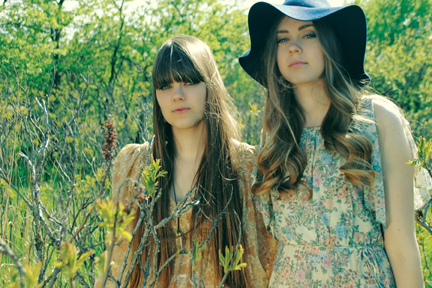Spotlight: First Aid Kit

Photo by Neil Krug
The Omaha Sound – a la Bright Eyes, Orenda Fink and Maria Taylor – is burgeoning in Sweden’s indie music scene. Some of the most acclaimed folk music, as of late, has come out of this Nordic country: The Tallest Man on Earth, José González, and now, Klara and Johanna Söderberg – better known as First Aid Kit.
From a black leather couch in the dimly-lit green room of Oakland, Calif.‘s illustrious Fox Theatre, 21-year-old Johanna – the duo’s autoharpist, keyboardist and supporting vocalist – mentions that, as kids, they listened to more heavily produced, radio-friendly music. “[Then] we found the band Bright Eyes [randomly],” she remarks. “[American folk music] is really honest and simplistic but very touching.”
She continues: “[In it], there’s this tradition of music being a very important part of your life. I think we heard that and felt a connection there.”
In Enskede, a suburb outside of Stockholm, the Söderberg sisters grew up with music playing a central role in their family life. “[Music] was always around us when we were growing up,” interjects 18-year-old Klara – guitarist, lead vocalist, and primary songwriter of the two – who plops down next to Johanna.
Their father, who was in the Swedish band Lolita Pop in the ‘80s, exemplified that making a career as a musician is possible, and inspired Klara and Johanna to pursue music full-time. “We probably wouldn’t be here if [our parents] didn’t make music, I think,” Johanna adds. It’s definitely a family thing."
Klara picked up her first guitar at 13. “[The reason I chose] guitar is because all this music I heard made me [think], ‘Can I do this? Can I [inspire] other people [with] something that I can make?’” she says in a soft tone. When the sisters began to play live in front of audiences, they figured that Johanna should play something, too – so she learned how to play keyboard and autoharp.
That same year, Klara dubbed their act, First Aid Kit, “because it sounded cool,” but as time went on, they grew to like their moniker and found that it suited them. “[Music] helps people everyday to get through stuff,” she says with a hint of abashment in her voice, explaining the band name’s hokey origins. “We feel like we want our music to be sort of a first aid kit for the people that listen to it.”
Klara wrote “Tangerine,” a song about a woman whose husband is seeing another woman, for Drunken Trees, their first EP. “Obviously, when I was 14, I did not know very much about that stuff,” she laughs. “Our parents are happily married [but] it was just something that I felt I could relate to in some way.”
These themes of betrayal, anguish and regret reappear on their new country-infused, pop folk full-length, The Lion’s Roar, which comes out this January. Klara’s whiskey-soaked vocals wistfully hover above austere yet radiant arrangements, juxtaposing heart-wrenching lyrics and majestic melodies. In the title track, the sisters croon its melancholic chorus: “And I’m a goddamned coward/ But then again so are you /And the lion’s roar, the lion’s roar,” above booming drums, cascading flutes and unyielding acoustic guitar.
Johanna elaborates, “The music is beautiful but the lyrics are rough. I think that’s an interesting contrast. It’s very apparent in country music in general – these terrible stories of life sung in a beautiful way.” Another tune on the album, “Emmylou,” points to some of likely sources of such inspiration: “I’ll be your Emmylou, I’ll be your June/ You’ll be my Graham and my Johnny, too.”
On The Lion’s Roar, their first album produced in United States, the sisters used a full band, including Mattias Bergqvist on drums; their father, Benkt, on bass; Mike Mogis and Nate Walcott (both of Bright Eyes); and numerous other Omaha, Neb.-based musicians rounding out the sound. The Felice Brothers, who just happened to be cruising through town, joined the recording session and appear on the closing track, “King of the World,” on which Bright Eyes singer/songwriter Conor Oberst, sings the final verse.
“[It is] pretty indescribable,” Klara says of what it was felt like to work with Oberst, whose music ignited the group’s passion for American folk and country. “There are no words [to] really [describe the feeling] when you get to collaborate with someone that’s inspired you so much. I don’t think he knows how much he’s inspired us. [He’d] probably be scared, if he knew.”



















